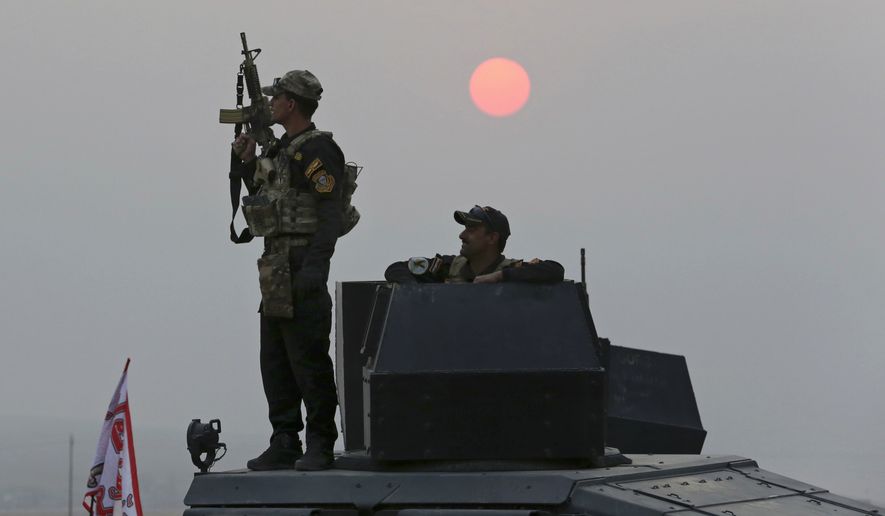The Islamic State has launched a string of vicious, coordinated counterstrikes across Iraq in an attempt to splinter the focus of U.S.-backed Iraqi forces fighting to retake the extremist-held city of Mosul.
Terror cells tied to the group, also known as ISIS, ISIL and Daesh, lashed out in the Kurdish-held northern Iraqi cities of Kirkuk and Sinjar, forcing Iraqi commanders to split off much-needed manpower from the Mosul operation to quell those attacks.
Iraqi officials said bombing in Baghdad Monday killed 11 civilians and wounded 35.
The attack in Kirkuk “has largely been dealt with,” Pentagon spokesman Capt. Jeff Davis said Monday. But Iraqi Prime Minister Haider al-Abadi was forced to call in reinforcements from Mosul, Baghdad and elsewhere in the country to ultimately drive Islamic State fighters from the city, according to local reports.
Late Monday, Iraqi news outlets reported the city of al-Rutbah in the country’s volatile Anbar province had fallen back into Islamic State control. Iraqi forces and American warplanes wrested control of al-Rutbah from the terror group in July.
The attacks come as Islamic State resistance is stiffening along Mosul’s southern and eastern borders. Advancing Iraqi and Kurdish forces have been met with waves of carbombs and suicide attacks amid Kurdish forces opening up a new front along the city’s northern edges this week.
Pressuring the already-strained Iraqi military could expose weakness in the country’s armed forces, which had to be completely rebuilt after Islamic State’s brutal sweep through the country two years ago.
“Their ability to generate forces has been their biggest challenge,” Maj. Gen. Gary Volesky, the top U.S. ground commander in Iraq, said last Wednesday.
“So if you want to get 10 brigades or 12 brigades ready to go liberate Mosul, you’ve got to figure out where those 10 are coming and how you pull them out of the fight they’re currently in,” he said.
U.S. and coalition military officials estimated last week it would take 35,000 to 40,000 troops to hold Mosul once the Islamic State is driven out.
Despite those reports, Baghdad remains committed to retaking Mosul, Iraq’s second-largest city, from the Islamic State’s grip, Capt. Davis said.
He downplayed Monday’s Islamic State counterattacks, saying those offensives were similar to cities and provinces in Afghanistan that ping-pong between Taliban and government control.
The Pentagon spokesman did note the attacks were a clear shift in strategy by Islamic State in an attempt to stave off the long-awaited assault on Mosul.
“As they feel the pressure in Mosul, they will try to divert attention” by launching more attacks on territory already cleared by Iraqi and Kurdish forces, Capt. Davis said. “We expect attacks on Iraqi territory to continue” as Mosul comes within reach of Iraqi and coalition forces, he added.
• Carlo Muñoz can be reached at cmunoz@washingtontimes.com.




Please read our comment policy before commenting.